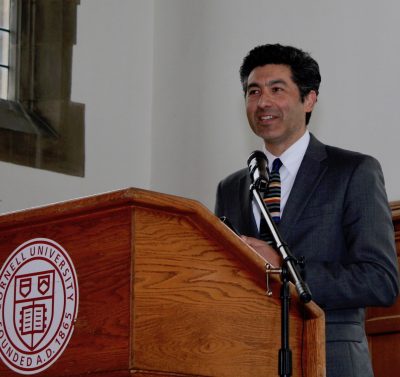De-emphasize GREs, look broadly for new Ph.D. students: expert

By Katya Hrichak
Revised 10/10/18
Keivan Stassun, professor of physics and astronomy at Vanderbilt University, shared lessons learned from transforming admissions processes to overcome barriers to diversifying graduate fields in an Oct. 2 lecture, “Holistic Admissions: Achieving Diversity at the Ph.D. Level.”
Stassun, founder of the Fisk-Vanderbilt Master-to-Ph.D. Bridge Program, cited a study from the American Physical Society and the American Institute of Physics that found only 20 African-American women nationwide graduated with doctoral degrees in physics over a recent five-year period. “What that means is that you get one underrepresented minority student [who] maybe comes in, [and] they spend their entire Ph.D. experience without ever seeing another person like them,” Stassun said.
According to Stassun, the traditional pathway to a Ph.D. is not always as effective for underrepresented minorities as it is for others, and Graduate Record Examinations testing has proved to be a barrier in many cases.
Traditionally, students earn a bachelor’s degree at one institution and a doctoral degree at a second, without seeking a master’s in between; studies show underrepresented minorities find the most success by receiving a bachelor’s at one institution, a master’s at a second and a Ph.D. at a third. The Bridge Program fully funds the intermediate step.
And the Bridge Program does not require the GRE. Studies on GRE results show women interested in physics and chemistry programs score 80 points less than their male counterparts on the math section, and underrepresented minorities score on average 200 points less than white and Asian counterparts. Stassun said all of the individuals represented in the study data had an undergraduate GPA of 3.7 or higher.
“The fact is, there are a lot of people lining up and paying good money to take these exams, presumably not for the fun of it, presumably because they’re at least contemplating going to graduate school,” Stassun said. In addition to overlooked students, “There really are lots of students who don’t even bother applying because they see the outcomes of their GRE scores and they think they know what that implies for their chances. And, unfortunately, in many cases, they’re probably right.”
Rather than relying heavily on test scores, the Bridge Program developed an alternative process in which the admissions team interviews three times as many students as they intend to admit, allowing them to select students from different levels of the applicant pool. Virtual interviews are conducted by voice only to reduce implicit bias and candidates are evaluated for basic academic preparation, grit and capacity for growth.
By using this process, Stassun found they “cast a wider net” and speak with students who traditionally would have been screened out.
“In essence, what I’m recommending to you here is a bit less of a reliance on GRE and a bit more of getting a more holistic picture of who your top candidates are,” he said. “You’ll end up with better students and you’ll end up with more diversity in your program.”
The Cornell Graduate School has a long-standing tradition of allowing each graduate field to decide whether or not to require the GRE, but in recent years, several fields have altered their admissions processes for a more holistic approach.
While the graduate field of philosophy has not required the GRE for a long time, fields of biomedical and biological sciences, biophysics and biochemistry, molecular and cell biology, and genetics, genomics and development have recently decided to drop the GRE requirement. Instead they look for other predictors of success such as undergraduate research experience and performance in the most relevant coursework.
In the graduate field of computer science, new approaches include what Anitra Douglas-McCarthy, senior director of recruitment at the Graduate School, calls “proactive recruitment.” Rather than waiting for applications to be submitted the students and faculty in the department form partnerships and participate in targeted recruitment activities. The GRE is no longer required but is recommended.
Douglas-McCarthy noted that in addition to the changing GRE requirements and recruitment approaches, many graduate fields are focusing more attention on recruiting applicants from smaller schools, liberal arts colleges, minority-serving institutions and other institutions that may have a larger proportion of diverse applicants. Institutional Research and Planning (IRP) and the Graduate School Office of Inclusion and Student Engagement partnered to develop a pipeline tool that identifies such schools for each discipline.
“Most of the fields have been looking at students holistically, which is exactly what we want to continue to build upon,” she said.
The lecture was hosted by the Graduate School Office of Inclusion and Student Engagement and Cornell’s Center for the Integration of Research, Teaching and Learning, and supported by the National Science Foundation and Cornell’s Department of Physics.
Katya Hrichak is a communications assistant in the Graduate School.

